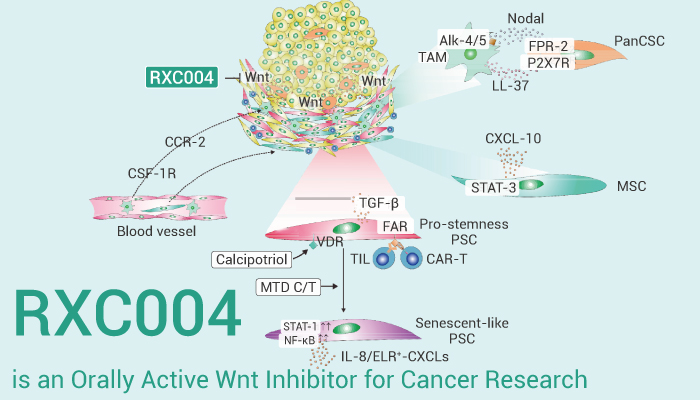Wnt pathway aberrations are common in gastrointestinal cancers. There are canonical Wnt pathway and noncanonical Wnts. First of all, the canonical Wnt pathway is activated via canonical Wnt ligands binding to Frizzled receptors coupled to low-density lipoprotein receptor-related protein (LRP) 5 or 6. Moreover, the canonical Wnt pathway leads to stabilization of β-catenin by disrupting the inhibitory complex of adenomatous polyposis coli (APC), Axin and glycogen synthase kinase-3β. Then activation of transcription factor and/or lymphoid enhancer binding factors. Secondly, noncanonical Wnts (e.g.,Wnt5a) activate alternate downstream pathways. However, both Wnt pathways play an important role in cancers, with effects on proliferation, stemness, and immune evasion. In addition, targeting Wnt signaling is challenging due to on-target toxicity concerns and lack of druggable pathway components. Hence, we will introduce an orally active Wnt inhibitor-RXC004.

RXC004 is an orally active Wnt inhibitor for cancer research.
In vitro, RXC004 downregulates mRNA expression of Wnt pathway targets Axin2, RNF43 (both involved in the negative-feedback mechanism of the Wnt pathway), c-Myc, CD44, and MMP7 in RNF43 LoF mutations and RSPO3 fusions cells. In addition, RXC004 caused a marked increase in mucin mRNA, a marker of epithelial cell differentiation.
When in vivo experiments, RXC004 (1.5, 5 mg/kg; p.o.; twice daily; for 28 days) reduces in tumor growth, and inhibits gene expression of Wnt-responsive, including cMyc. Moreover, RXC004 (1.5, 5 mg/kg, once daily) reduces Ki67-positive cells in the total tumor area. Moreover, the effect of RXC004 is more pronounced in differentiated tumor areas, and by inhibiting immune evasion in the B16F10 “cold” tumor model antitumor effect. Besides, RXC004 (1.5, 5 mg/kg; p.o.; once daily) stimulates host tumor immunity, reduces resident myeloid-derived suppressor cells within B16F10 tumors and synergizing with anti-programmed cell death protein-1 (PD-1, HY-P73361) to increase CD8+/regulatory T cell ratios within CT26 tumors.
All in all, RXC004 is a promising Wnt inhibitor for cancer research.
Reference:
[1] Phillips C, et al. Cancer Res Commun. 2022 Sep 2;2(9):914-928.